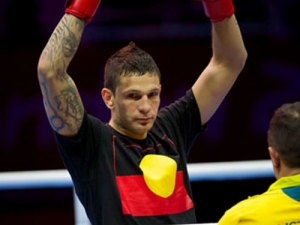By Alex McAuley
The Australian Olympic Committee (AOC) has forced Hooper to apologise and to commit to only wearing his Australian team uniform in the future. Many, including boxing officials in Australia, have criticised the “overreaction” of AOC. But the disciplinary action reveals not just an overzealous bureaucracy, but the nasty chauvinism underlying the London games.
Upon entering the ring Hooper was reported to the International Olympics Committee (IOC) for breaching Rule 50 of the Olympic Charter, which prohibits any kind of “demonstration or political, religious or racial propaganda in any Olympic sites, venues or other areas.” Of course this rule does not apply to major sponsors or the governments of member nations.
Olympics authorities have gone out of their way to protect the exclusive rights of sponsors to plaster their logos across London. In the same way the IOC seeks to protect the “branding” of powerful nations participating in the games. This means silencing the voices of oppressed groups whose beliefs or very existence calls into question the legitimacy of competitor nations. Most infamously the IOC stripped Black American runners Tommy Smith and John Carlos of their gold and bronze medals at the 1968 games for raising their fists in a Black Power salute on the podium in solidarity with the US civil rights movement.
The rank hypocrisy of Hooper’s censure is put into relief by the constant celebration of all things British at the Games. The opening ceremony was an epic three and a half hour whitewash of history’s bloodiest colonial empire which was widely applauded as an “irreverent, but never disrespectful” celebration of the “quirky” Brits. Damien Hooper’s celebration of his people’s survival of a genocide initiated by Britain flies in the face of this cosy image.
Like the empire that spawned it, the Australian nation is built upon genocide and dispossession. Flags symbolising this fact are emblazoned on the national team uniform, raised at the moment of any victory, and waved by thousands in the crowd. Yet it is Hooper that is guilty of displaying “political or racial propaganda.”
By Teresa Smith
“What’s the big deal?” said Firth. “The IOC (International Olympic Committee) should examine themselves, broaden their horizons, and wake up.”
“Sure, you shouldn’t involve politics with sports,” she said. “But in reality, all sports are political—even on the Olympic level.”
She and her sister, Shirley Firth-Larsson, were the first two aboriginal females to be members of Canada’s Women’s National Cross-Country Ski Team. They went to the Olympics four times between 1970 and 1982.
“We came up against racism from the Canadian Olympic Committee—but that wasn’t our problem. It was theirs,” said Firth, who said she competed first as a Dene woman, and second for Canada.
“We were pioneers—out there creating political statements whether we liked it or not—because anywhere we show our face, it’s political.”
The idea that there is no place for political protest at the Olympics is also a wild sanitization of the games given that there has been dissent and protest at the games as long as the modern games have been held. Remember in 2000 when Cathy Freeman, who is also Indigenous and from the Australian team, carried the same “Aboriginal flag” around the track in her victory lap?
Hooper says he is very proud of what he did, and he should be proud. He showed Indigenous Peoples all over the world that he gets it–that settler states occupy our lands, they ignore our traditional governments, they try and beat us down, but they cannot take away our pride in being Indigenous. He showed us he remembered his family, his community, and his nation, above all else. He took a risk in the biggest sporting event of his life to tell those Old Ones that he remembered. To tell me, he remembered.
The only person in this non-fiasco fiasco that is owed an apology is Damien Hooper. To compete in the Olympics you shouldn’t have to deny your nationality, you shouldn’t have to erase your Indigeneity, and you should never be threatened or made to apologize for being who you are.
News flash: How nations come into existence, how they define themselves, who they include and exclude as citizens are all political issues. The parade of nations at the Olympics is a statement about who's politically accepted, and acceptable. In other words, who's in and who's out.
What's the justification for Olympic nationalism, anyway? I'd love to hear an explanation that doesn't involve politics. Pride in one's nation? That's a political issue.
If you don't want politics at the Olympics, then abolish the national teams. Have everyone compete as individuals. Why not, if no politics are involved? A nonpolitical event should have no interest in nations or any political entity.
For more on the Olympics, see Apaches Perform No-Rain Dance and Native Athletes in 2012 Olympics.


No comments:
Post a Comment